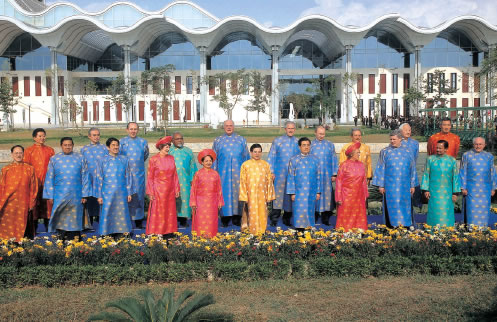A Asia and the Pacific
Asia, having come a full decade since the Asian Economic Crisis of 1997, has overcome the crisis' impact and is now riding a wave of globalization and enjoying rapid economic progress. This has resulted in a deepening of intraregional mutual interdependence and the creation of a sense of community through the permeation of shared lifestyles and other factors. Moreover, it has brought about forward-looking changes towards further development for the region by serving as background to increasingly intense discussions regarding the creation of an East Asian community. However, at the same time, there are issues that must be faced in forging an Asia of stability, prosperity, and cooperation, including issues that directly affect the security of Japan, such as the situations on the Korean peninsula and across the Taiwan Strait, challenging issues common to the entire region such as terrorism, piracy, energy issues, and new strains of influenza and other infectious diseases, and destabilizing factors such as the rise of nationalism.
Furthermore, in Asia, structural changes unprecedented anywhere around the globe are underway, as China and India, having populations of one-fifth and one-sixth of the world's population respectively, simultaneously rise to the forefront in such fields as politics, security, and economics. A major topic for Japanese diplomacy in the months and years to come is thus how the potential of these two countries can be elicited constructively in ways that contribute to the stability and sustainable growth of both Asia and the world.

Leaders from various economies at the APEC Economic Leaders' Meeting
(November 19, Hanoi, Vietnam; Photo: Cabinet Public Relations Office, Cabinet Secretariat)
With this in mind, the fundamental objective of Japan's diplomacy in Asia and the Pacific is to lead the region to become one which shares universal values, characterized by long-term stability and predictability and grounded in mutual understanding and cooperation. In accordance with the policy of creating an Arc of Freedom and Prosperity, Japan will be taking up the following three fundamental principles in its diplomacy towards the Asia-Pacific region.
The first of these is that, in order to establish stable international relations, Japan must engage in confidence-building with other countries and resolve issues through diplomatic channels, firmly maintaining the Japan-US Security Arrangements, which are critical for the security of the region, and continuing to ensure deterrence against any movement that might destabilize the region as it strengthens its strategic partnerships with stable democracies such as Australia and India. At the same time, Japan calls for increased transparency in any movement towards a military buildup.
The second is that Japan will elicit the region's potential to the greatest possible extent in dealing with common regional issues by taking a multilayered approach. This approach will include not only bilateral diplomacy but also the promotion of East Asian regional cooperation, such as through the East Asia Summit (EAS), ASEAN + 3, Japan-ASEAN, and Japan-China-ROK frameworks, and cooperation that broadly incorporates countries outside the region, such as cooperation with APEC, ARF, and ASEM. In addition, within these efforts, Japan will promote the establishment of universal values.
The third is that Japan squarely faces the facts of history in a spirit of humility, that in the past it has caused tremendous damage and suffering to the people in Asian nations. With feelings of deep remorse and heartfelt apology always engraved in mind, Japan has consistently made efforts for the past 60 years as a “peaceful nation” underpinned by its solid democracy and market economy. As a forerunner, Japan will continue to undertake various kinds of cooperation, including efforts for the consolidation of peace, reinforcement of governance, and development of economic rules while supporting the development of an Asia grounded in common values.